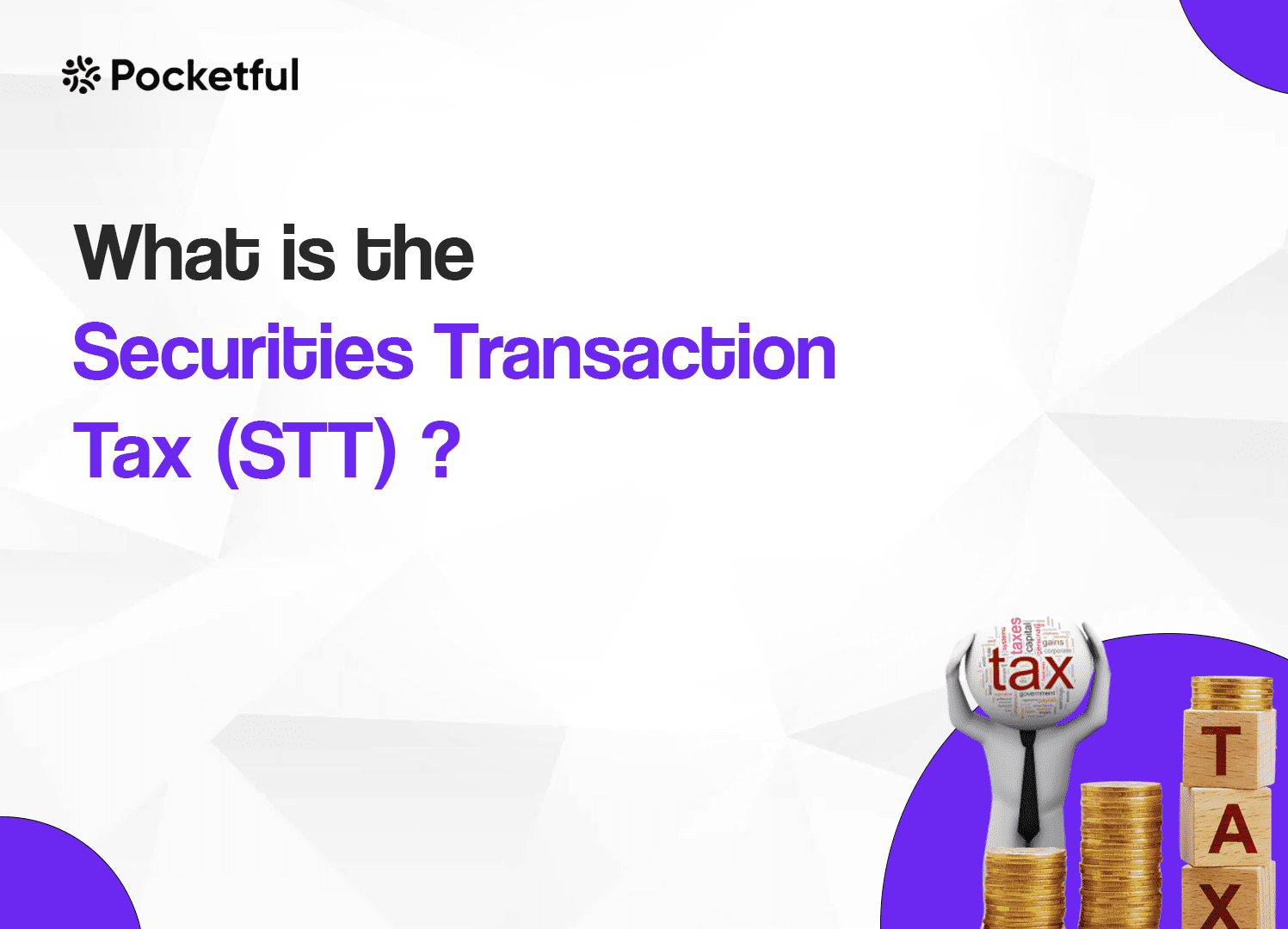| Type | Description | Contributor | Date |
|---|---|---|---|
| Post created | Pocketful Team | Jun-26-24 | |
| Add new links | Nisha | Mar-12-25 |
What is Securities Transaction Tax (STT)?

Do you regularly trade in the stock market and worry about the many taxes that the Indian government has put in place and how they are reducing your return? Fear not—we’ve got you covered.
In today’s blog, we will discuss one such tax, the “Securities Transaction Tax.”
Overview of Securities Transaction Tax (STT)
The Indian government levies this type of tax on the buying and selling of shares, mutual funds with an equity focus, and derivatives that are exchanged on the Indian stock exchange. This tax, which is levied on the transaction value and applies to both share buyers and sellers, increases the transaction cost. The Securities Transaction Tax Act (STT Act) regulates this type of direct taxation. Unlisted shares sold through an IPO or other offer for sale to the public are likewise subject to this tax.
History of Securities Transaction Tax
P. Chidambaram, a former finance minister, instituted this tax in 2004. It is levied based on the value of securities, as the name implies (excluding commodities and cash). After numerous brokers and trading members protested this charge, the government was compelled to lower the STT tax in 2013.
Meaning of Securities

The term “Securities” has been defined under the Securities Contracts (Regulation) Act and includes the following:
- Shares, scripts, bonds, and other marketable securities.
- Derivatives instruments.
- Government securities of an equity nature.
- Units of equity-oriented mutual funds.
Features of STT
- The tax rate varies based on the type of security and the type of transaction. For instance, the tax rate differs for delivery-based and intraday transactions.
- It is calculated as a fixed percentage of the transaction value.
- STT is levied on both buy and sell transactions.
- Depositories and exchanges collect it at the point of transaction and automatically deduct it during the settlement process.
- STT is a source of revenue for governments.
Securities Transaction Tax Rate

The tax rates of STT for different types of transactions and securities are as follows-
- Purchase of Shares – In the case of delivery-based purchases of equity shares, the rate of STT is 0.1% and is paid by the purchaser at a price on which equity shares are purchased.
- Sale of Shares – In the case of the delivery-based sale of equity shares, there is a similar tax rate of 0.1%, but the seller pays it at a price at which equity shares are sold. On an intraday basis, the applicable tax rate is 0.025%.
- Equity Mutual Funds – In this case, units of an equity-oriented mutual fund sold outside of the delivery or transfer on a recognised stock exchange, the tax rate is 0.025% and is paid by the seller at a price on which equity share or units is sold. In a delivery-based sale, the seller pays 0.0001% of the price at which the unit was sold.
- Derivative Options – While selling option securities, 0.0625% of the value of option premium is to be paid as tax by the seller.
- Derivative Futures – In the case of the sale of futures in securities, the applicable tax is 0.0125% of the price at which such futures contracts are traded.
- Exchange Traded Funds – In the case of exchange-traded funds, the applicable tax rate is 0.001% and is paid by the seller at the price at which units are sold.
- Unlisted Shares – When unlisted shares, such as IPOs, are sold and later listed on a stock exchange, the tax rate is 0.2%, and the seller must pay it at the price at which the units are sold.
Read Also: Types Of Taxes In India: Direct Tax And Indirect Tax
Example of Securities Transaction Tax
Assume that a trader has purchased 500 shares for INR 20 apiece, for a total of INR 10,000 and on the same day (intraday), they sold the same for INR 30. Then, in that case, the applicable STT rate will be 0.025%.
So, the STT will be based on the average price of the intraday trades. Here, the average price comes out to be 25 (average of 20 and 30), and the STT is around 0.025%*25*500 = INR 3.125
The applicable STT rate for futures is 0.0125%. If a trader purchases five lots of Nifty futures at INR 23000 each and sells them for INR 23010, with the Nifty lot size being 25, the STT will be determined as follows:
STT for this transaction will be approximately 0.0125%*23010*25*5 = INR 359.35
Impact of Securities Transaction Tax on Investors
This tax has a significant impact on investors in India; let us understand how.
- Transaction Cost – The applicable STT rate increases the cost of trading, eventually leading to a decline in investors’ returns, especially for those who trade frequently.
- Liquidity – As the STT will increase the transaction cost and decrease the trader’s profit, some investors prefer to stay away from the market and look for some other investment option, which will impact the market volume.
- Investment strategies – This can impact the investment strategy as market participants may shift to long-term investing rather than short-term trades.
- Net Return – The net return earned by the investor will reduce because of STT.
Read Also: What is Capital Gains Tax in India?
Conclusion
In summary, the government charges a securities transaction tax on all transactions, including the purchase of stocks, mutual funds, derivatives, and other financial instruments on stock exchanges. Without a doubt, these taxes reduce your net return, but there is no getting around the fact that the Indian government depends heavily on them.
Frequently Asked Questions (FAQs)
Is the Securities Transaction Tax a direct tax or indirect tax?
The STT is a direct tax levied on the purchase and sale of equity and equity-related instruments listed on Indian Stock Exchanges.
Is there any way to avoid paying STT on transactions?
No, if you made any purchase or sale of equity shares or mutual fund units, it will automatically be deducted.
What is the difference between Capital gain tax and Securities Transaction Tax?
STT is a kind of direct tax applicable at the time of transaction made in securities, whereas capital gain tax is levied on the profit arising on the sale of assets.
In which year was the Securities Transaction Tax introduced in India?
STT was introduced in 2004 by former finance minister P. Chidambaram.
Is STT applicable on both buy and sell?
Yes, STT is applicable to both buying and selling securities listed on Indian Stock Exchanges.
Disclaimer
The securities, funds, and strategies discussed in this blog are provided for informational purposes only. They do not represent endorsements or recommendations. Investors should conduct their own research and seek professional advice before making any investment decisions.